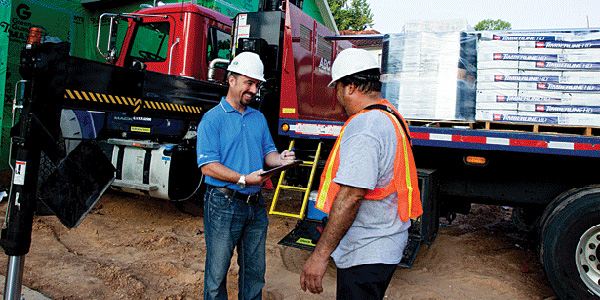Department of Labor Targets Construction Industry

By Lauren White. RCS Reporter.
How to prepare your business for an investigation.
Recently, companies in the construction industry, both small and large, have been targeted by the United States Department of Labor (DOL). Investigations are taking place in an attempt to diminish labor employment infractions.
How is an Investigation Conducted?
“The DOL is the department of the U.S. federal government responsible for occupational safety, wage and hour standards, and unemployment insurance benefits, among other employment-related areas of the law,” according to Cotney Construction Law. DOL agents are stationed nationwide and are tasked with determining if businesses are compliant with employment laws. They do this by conducting wage-and-hour investigations and examining employment records.
Typically, employee complaints initiate investigations. However, the DOL is able to conduct investigations unannounced. Employers usually receive some notification that their workplace will be investigated in order to prepare company records for the DOL.
It’s important to understand the procedures of a DOL investigation, which include: the DOL agent examining company records, reviewing payroll and other wage and hour records, holding private interviews with employees, and having a meeting with the employer. During the final meeting, the agent will inform the employer of any violations and provide guidance on how to correct the infractions.
What is the Penalty for a Violation?
“During an investigation, if a DOL agent determines that the employer has violated a federal labor employment law, the employer will receive some form of penalty,” according to Cotney Construction Law. Wage and hour violation penalties are determined on a case-by-case basis. However, if a construction business fails to comply with labor laws, they will be penalized. Examples of possible penalties include:
-
Recommend Changes: First-time or inadvertent violations can result in the DOL simply recommending administrative adjustments to the company so they remain compliant in the future.
-
Pay Damages: Through a settlement with the employer, the company will need to pay back any owed wages to employees, pay liquidated damages, or civil money penalties.
-
Civil Penalties: The employer may need to pay civil penalties for persistent or repeated wage and hour violations, or crimes related to the violation of child labor laws.
-
Litigation: A lawsuit can be filed by the DOL for employees that are overdue for additional compensation. According to Cotney Law, “The DOL can also seek a U.S. District Court injunction to prevent further violations...Lastly, an employee also has the legal right to seek recovery of lost wages or liquidated damages in a private suit.”
-
Criminal Penalty: Excessive fines and imprisonment are the result of continuously or willfully offending labor laws
Penalties for violations can vary “Depending on the severity of the violation, if this is a repeat violation, or whether or not the violation was inadvertent or deliberate…” Cotney Construction Law shares. Construction lawyers can help make sure your business is compliant with labor rules and restrictions.
Should I Cooperate with a DOL Investigation?
“As a federal agency, the DOL has a right to inspect company and payroll records and question employees of a business; however, the Fourth Amendment of the Constitution prohibits unreasonable searches and seizures,” Cotney Construction Law explains. A voluntary consent form or an administrative subpoena is necessary for a federal agent to inspect property, examine records, or interview any employees.
Cotney Construction Law discloses that, “Although your business may technically be protected from a DOL investigation, interference with an ongoing investigation is forbidden by law.” Contact a construction attorney if you hear from a DOL agent.
Understanding the Fair Labor Standards Act (FLSA)
Violations related to the Fair Labor Standards Act (FLSA) are the most common and receive the most attention from the DOL. According to Cotney Construction Law, “Administered by the Wage and Hour Division (WHD) of the DOL, the FLSA ‘establishes minimum wage, overtime pay, recordkeeping, and child labor standards affecting full-time and part-time workers in the private sector and in Federal, State, and local governments.’”
Workweek, Hours Worked, and Minimum Wage Requirements
A workweek is defined by Cotney Construction Law as a, “...40-hour interval of time over a period of 168 hours during a seven day period. A workweek can begin at any point during the week.” When an employee is performing work-related tasks, at their workplace or another location, those are considered “hours worked.” They count their hours worked starting at the first task of the day and end at the final task of the day.
$7.25 is the federal minimum wage. If a state’s minimum wage is higher than the federal rate, employers must pay their employees the higher rate.
Unpaid Overtime
Each hour worked after 40 hours in a workweek is considered to be overtime. It’s a requirement that nonexempt workers are paid one and a half times the regular hourly rate. Supervisor-level employees, employees with specialized positions, and some others depending on their responsibilities, may be exempt from overtime. Overtime laws are violated by employers typically when they make one of the following errors: inaccurately tracking employee hours worked, discounting certain work tasks, calculating hours bi-weekly instead of weekly, and refusing to pay certain non-exempt employees overtime.
Consult an attorney or read up on job requirements and positions that are exempt from overtime to ensure you’re in compliance with overtime laws. Additionally, it’s important to maintain correct payroll records and overtime pay calculations. Ensure that you’re paying employees who work more than the 40-hour workweek.
Recordkeeping
Employers need to keep accurate records and data, as required by the FLSA. These include:
-
Employee’s basic personal information (name, address, occupation, age)
-
Total hours worked each week
-
Total daily and weekly earnings
-
Hourly pay rate including overtime work
-
Total overtime pay for a workweek
-
Total deduction from wages
-
Total wages paid every pay period
-
Recordkeeping documents: time cards and work time schedules
Cotney Construction Law urges employers to maintain these records since, “Failure to retain these documents or failure to provide government inspectors with access to these records can result in additional penalties for wage violations.” Additionally, destruction of recordkeeping can result in an infraction of up to $10,000 as it is a serious offense.
Child Labor Laws
These laws are in place to ensure the health and safety of employed children. The FLSA has provisions that restrict the amount of hours workers younger than 16 can work. Cotney Construction Law shares that, “There are also certain job responsibilities in construction that are considered too hazardous to be performed by minors including the following types of tasks: driving a motor vehicle, roofing jobs, operating power-driven circular saws and other dangerous machinery, trenching or excavating, exposure to radioactive substances.”
Employers should be aware of certain child labor laws such as, workers 18 or older can do any job for unlimited hours, minors age 16 or 17 can work for an unlimited amount of hours doing jobs that are non-hazardous, and workers under 16 are only able to perform non-hazardous work. Under 16, employees can only work up to three hours on a school day and a total of 18 hours in a school week. Additionally, they can work eight hours on a non-school day or 40 hours during a non-school week.
Other Important Labor Laws
The WHD and the FLSA also control the labor laws below:
Other Important Labor Topics
Cotney Construction Law urges employers to acknowledge and understand the following labor practices that relate to their business:
-
Displaying the required posters that communicate labor employment rights to employees.
-
Understanding the different requirements that exempt an employee from overtime pay, and knowing the difference between salaried and hourly workers.
-
Realizing there are different forms of compensatory time such as training time, travel time, and time workers are on-site before and after their shift.
-
Knowing if you have primarily independent contractors or employees
-
Being aware of employees complaining or reporting your business to the DOL for supposed wage and hour law violations. Asking yourself if any employees have experienced negative actions such as a demotion, reduced hours, or terminated employment for waging the complaint.
Since the DOL has been increasing their investigations on businesses in the construction industry, consider partnering with a construction law firm to make sure your business is compliant with the labor laws. Cotney Construction Law explains, “From educating your workforce to reviewing employment record and policies, it’s critical that you prepare your workplace for a potential investigation.”
If you have questions regarding labor laws, contact a construction attorney at Cotney Construction Law.
Find out about CCL subscriptions.
Disclaimer: The information contained in this article is for general educational information only. This information does not constitute legal advice, is not intended to constitute legal advice, nor should it be relied upon as legal advice for your specific factual pattern or situation.
Recommended For You

Families First Coronavirus Response Act
Read More ...
Florida enacts new mandatory Builder Warranty
Read More ...
The Roofing Economy: Insights From a Legal Expert
Read More ...

















Comments
Leave a Reply
Have an account? Login to leave a comment!
Sign In